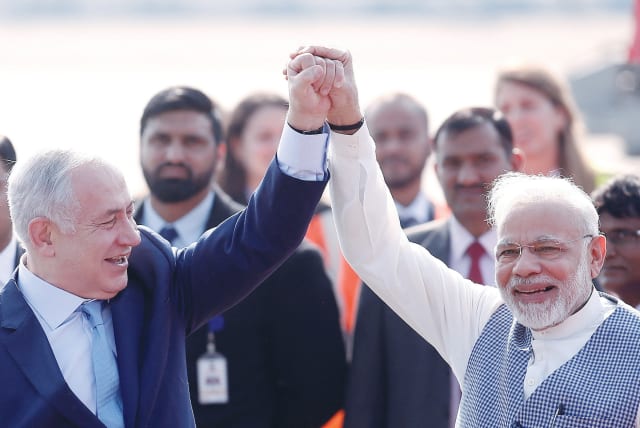India's support for Israel is not a given - opinion

Hence, there is a need for Israel to establish strong and meaningful connections with various sections of the political spectrum in India.
Many Indians, particularly those in political and strategic circles aligned with the Right camp, strongly support Israel due to shared geopolitical interests, defense concerns, and common ideals.
These individuals are proud of their own nation and hold respect for Israel’s military and technological accomplishments. They study Israel’s counterterrorism policies with the same attention as a cricket fan studying a master spin bowler, hoping to pick up and apply similar strategies that will benefit both countries.
Moreover, this link is further strengthened by India’s joint production and acquisition of defense armaments from Israel, providing these people with a tangible aspect of their country’s national security.
On the other hand, those with Left leanings empathize with the Palestinian calls for human rights and independence. They remind others of India’s initial stance against dividing Palestine at the UN and its early acknowledgment of Palestine as a state. The Left compares the Palestinian fight to India’s own battle against colonial rule, evoking strong feelings of sympathy.
The Left camp, including quite a few in India’s diplomatic and judicial circles, views India’s backing of Palestine as evidence of its commitment to secularism, diversity, fairness on the global stage, and support for the oppressed.
So, which group in India stands as a true ally to Israel?
First, the political spectrum in India, which is distinctively different from that of Israel, needs to be understood to answer the question.
The political Right in India primarily focuses on Hindu nationalist ideals, emphasizing cultural identity, sovereignty, and economic development within a secular framework. In contrast, the political Right in Israel centers around Jewish nationalism, with a strong focus on security, the Jewish identity of the state, and settlement policies in disputed territories.
While both share an emphasis on national security and cultural identity, their underlying ideological and historical contexts differ significantly.
The Right prioritizes Hindu nationalism, which stems from the desire of the majority Hindu population to assert their cultural and religious uniqueness, more correctly, dominance, in the face of diverse religious and ethnic communities following the country’s independence.
In recent times, Prime Minister Narendra Modi, assisted by his lieutenant Amit Shah, has been driving up the domestic fervor towards Hinduism, intertwining the nation’s political and cultural ethos with the broader agenda of Hindu nationalism. This movement towards a Hindu national identity in public and political spheres has created a narrative where support for Israel is often seen as an extension of the ideological battle against perceived threats to national security and cultural integrity.
The domestic push towards Hinduism under their leadership impacts not only India’s foreign policy but also its internal policies, aligning the country with others that prioritize cultural and national security while opposing terrorism.
Even more in the same direction is expected if Yogi Adityanath, the current chief minister of Uttar Pradesh – the largest state in the country – becomes the next prime minister or is appointed to a ministerial position at the federal level.
On the flip side, if the Rahul Gandhi-led grand old Indian National Congress party comes to power in alliance with other smaller parties across the country in the upcoming national election scheduled later this year, they will emphasize India’s support for the Palestinian cause or even statehood.
The chances of such an alliance winning the national election seem unlikely at this moment, but it cannot be outright disregarded. Even if they win, the Left camp will not abandon trade associations and defense collaborations with Israel; rather, they will seek to deepen them as it would benefit India more than Israel.
Support from the right in India isn't guaranteed
There is indeed a possibility that the Right camp in India, should it return to power, may not extend its full political support to Israel’s military campaign in the Palestinian territories. This is evident from India’s recent voting in favor of the UN resolution condemning settlement activities in the “Occupied Palestinian Territory, including East Jerusalem, and in the occupied Syrian Golan.” It reflects a strategic re-calculation of India’s national interests in the broader Middle East context vis-a-vis Israel.
Thus, it can be derived that there is no single lasting ally to Israel in India. The larger masses in the country patronizing Israel’s national-security-driven military campaign against Hamas do not necessarily represent the official stance of the Indian government.
Hence, there is a need for Israel to establish strong and meaningful connections with various sections of the political spectrum in India.
The writer is an India-based lawyer specializing in cross-border trade and investments and a fellow with the South Asia Democratic Forum in Brussels.
Jerusalem Post Store
`; document.getElementById("linkPremium").innerHTML = cont; var divWithLink = document.getElementById("premium-link"); if (divWithLink !== null && divWithLink !== 'undefined') { divWithLink.style.border = "solid 1px #cb0f3e"; divWithLink.style.textAlign = "center"; divWithLink.style.marginBottom = "15px"; divWithLink.style.marginTop = "15px"; divWithLink.style.width = "100%"; divWithLink.style.backgroundColor = "#122952"; divWithLink.style.color = "#ffffff"; divWithLink.style.lineHeight = "1.5"; } } (function (v, i) { });

